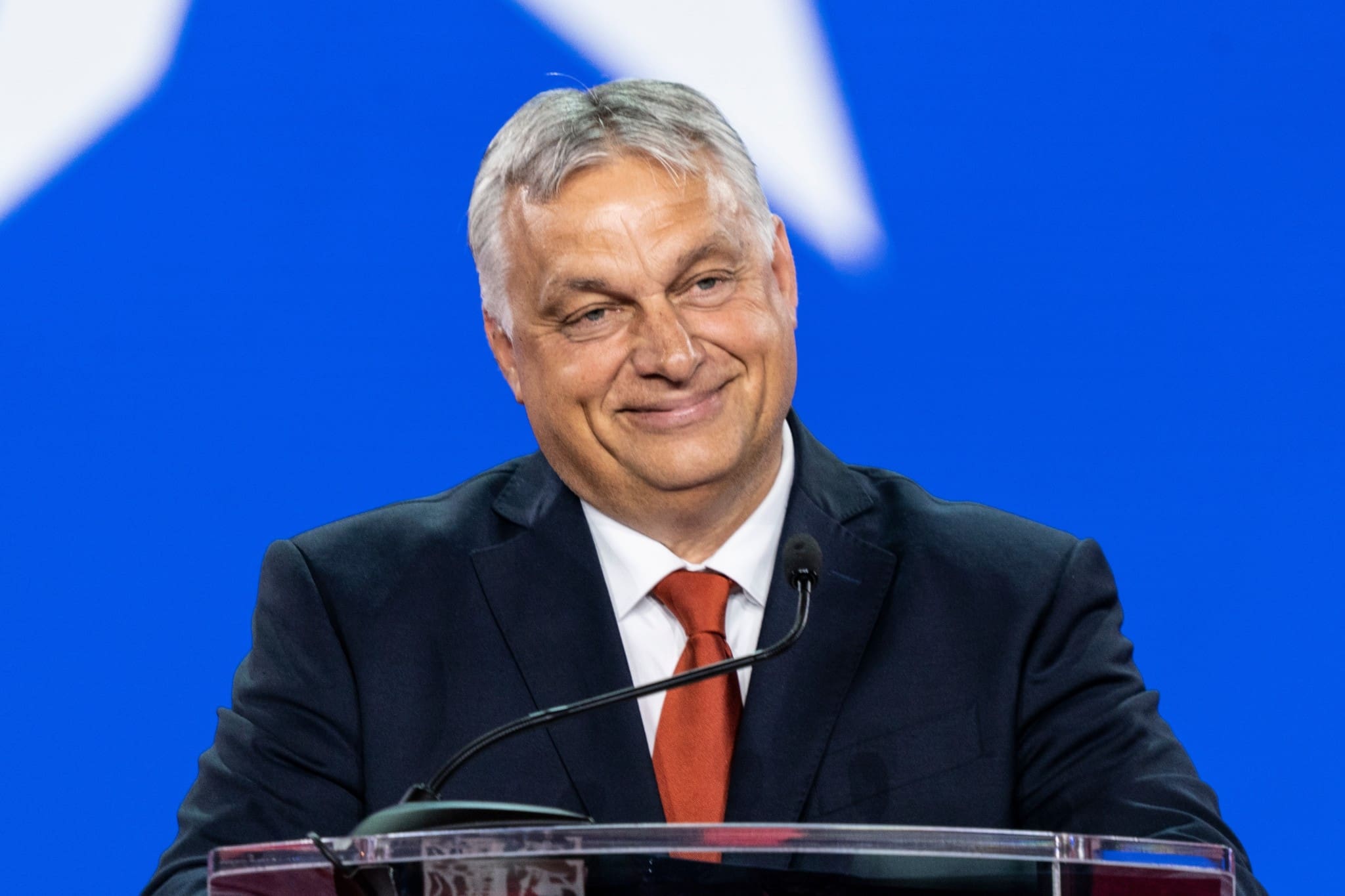In a new interview with Swiss media outlet Weltwoche, Hungarian Prime Minister Viktor Orbán discusses a wide range of topics, including the Ukraine war, why he believes neither side can win the conflict, why Democrats in power in the U.S. is bad news for Hungary, and what kind of short-term and long-term dangers mass immigration poses for the West.
Speaking about the outcome of the war in Ukraine, Orban declared that “no one can win.”
“A nuclear power with a population of 140 million is facing the Ukrainians, and the entirety of NATO is facing the Russians. That’s what makes it so dangerous. There is a stalemate that could easily turn into a world war,” he said.
Orbán pointed out that according to the Ukrainian deputy foreign minister, a Russian defeat is an acceptable compromise, underlining the high-stakes war that Europe and the globe are facing.
Orbán recalled that two weeks before the outbreak of war, he met Putin for the last time in Moscow, where the Russian president told him that Hungary’s NATO membership was not a problem, only Ukraine and Georgia’s.
“Putin’s problem is the American missile bases already established in Romania and Poland, as well as NATO’s possible expansion into Ukraine and Georgia in order to station weapons there,” said Orbán. “In addition, the Americans canceled important disarmament treaties. That’s why Putin could no longer sleep peacefully at night.”
He added, “I understand what Putin has said, but I don’t accept what he did.”
During the interview, the Hungarian prime minister also explained that “Russia is another civilization” where European political norms do not work, saying, “It doesn’t matter if we like it or not. We have to find a way to be able to live together with such a big, dangerous power as our neighbor Russia.”
What if Russia loses?
When Orbán was asked about the possibility of Russia losing the war, he said he does not want to imagine what will happen in that scenario.
“Russia is a nuclear power. It would be a geopolitical shock, a potentially devastating earthquake on a global scale, far worse than the collapse of Yugoslavia. The very fact that such scenarios are now taken lightly in the West testifies to a disturbing and even frightening distance from reality and blindness to the risks inherent in one’s own politics,” he said.
If Europe wants peace, it must first want it, according to Orbán. He stated that “peace begins in the heart; it must then reach the head, which then leads the hand.”
“This is the sequence: You have to wish for peace, then you have to want it, then you have to create it. Today, the will is lacking, at least in the West,” he said. He added, however, that much of the world wants the same thing, with the Chinese, Indians, Arabs, Turks, and Brazilians all explicitly backing a ceasefire and peace negotiations.
However, the West has bigger problems, including in its leadership role. “The West has lost its ability to unite the world for a cause. Its philosophical tenets are limited in space. This is a new phenomenon,” Orbán said.
He added that while peace should be the goal, Europe must also be able to defend itself and pointed out that he supported a “European NATO” all the way back in 2012.
The prime minister agreed with the journalist’s suggestion that the deeper reason for Europe’s weakness is to be found in the European Union because it “disintegrates nation-states without putting anything workable in their place.
“The EU wants an ‘ever closer union.’ We don’t agree on the goal… This is the cause of Europe’s sickness.”
American politics
When asked by Weltwoche what should happen in the United States and whether politics can change there, Orbán called the Hungarian experience clear: “When the Democrats are in power in Washington, we run for cover. They always want to change us, just like the politicians in Brussels. They want to dictate to us how to handle migration and how to teach our children. This is disrespectful.”
“We are a successful country, and we are doing our bit for Europe. We are the defenders of the castles on the edge of the continent. This work is not recognized. That’s why we look forward to seeing our Republican friends back in power,” said Orbán.
As Remix News has reported, the Biden administration has pumped millions of dollars into left-wing opposition newspapers in a clear example of interference in Hungary’s domestic press. In addition, Hungary’s domestic intelligence services have released a report detailing how Hungary’s opposition political parties received millions of dollars in “dark money” funding from the United States in the run-up to the April elections last year. Biden, in the run-up to the 2020 presidential election, also described Hungary as a “totalitarian regime.”
Orbán is known for his long-running and warm relationship with former President Donald Trump, and said that Trump is not the world’s last hope for peace, “but he is a hope.” Trump has been vocal as of late about the threat of nuclear war and has also called for a peaceful resolution with Russia, saying he would quickly end the war if he were still in office. Orbán appears to agree with this assessment, saying during the interview with Weltwoche that Trump would “probably succeed” in creating peace in a few weeks.
Globalization and Hungary
Hungary is a country highly reliant on free trade, but Orbán indicates that the world’s business and political elite are no longer purely interested in business.
“The preachers of globalization and free trade who meet every year at the World Economic Forum in Davos” have a new gospel: “the reorganization of globalization” in which “we are good, and they are bad.”
This new attitude of separating nations based on whether they adhere to the Western liberal order represents a serious danger for Hungary. He also points out that completely alienating and sanctioning Russia will not only harm Hungary but other European nations as well.
“We are an export-oriented country. 85 percent of our gross domestic product comes from exports. We have important cultural and economic relations in the East. The reorganization would be fatal for Hungary, but I think also for Germany,” he said.
Hungary pines for Swiss pines
Returning to Switzerland, the prime minister said the Alpine country acts “the way it wants but is not isolated,” which Orban sees as an example worth emulating.
“So preserving one’s own identity does not necessarily lead to provincialism. Switzerland is an important positive example,” said Viktor Orbán, who went so far as to say that if Hungary were where Switzerland is geographically, then “we would also be neutral.”
“This is a Swiss luxury. It doesn’t work for us (Hungarians),” he said.
The short-, medium- and long-term costs of migration
The prime minister also addressed migration, breaking the problem down into different time spans.
In the short term, the greatest danger inherent in uncontrolled migration is that countries will see a deterioration of public security and terrorism. Orbán’s point is backed by crime data from a wide range of countries, including Germany, Austria, Spain, France, Sweden and Switzerland.
In the medium term, Orbán labeled “economic losses” as the greatest threat, and with countries like Germany spending tens of billions on integration, housing, and social benefits, there is ample data to support his point there as well.
However, he points out that the demographic transformation taking place across the West is the greatest long-term threat: “that people no longer recognize their own country, that they lose their own homeland.”
Gender ideology
Orbán also addressed the topic of gender ideology, which increasingly dominates the discourse in Western nations. He said the greatest danger inherent in gender ideology is the fact that children between the ages of 14 and 18 must “grow into the world.”
“During this period, their identity should be strengthened, not weakened and destabilized, as gender ideologues do. (…) They are ruining our children. Irrevocably, irreversibly. They have no right to do that,” he said.
Hungary has been criticized by the EU for its stance on the issue and its child protection law, which bans sexualized LGBT topics in classrooms.
Dictator for a day
Weltwoche referenced the time the former President of the European Commission Jean-Claude Juncker said to Orbán, “Here comes the dictator,” a moment that was captured on camera.
When asked by a journalist what the Hungarian prime minister would do if he were actually “the dictator of the Union” for a day, Orbán replied: “I would do what Mr. Juncker would have liked to do: I would get drunk. Fortunately, there is no such option.”
Juncker was notorious for his love for imbibing alcohol, and according to Spiegel, “Just about every Brussels journalist seems to have an anecdote to share among colleagues about Juncker drinking too much or allegedly smelling of alcohol. But doubts as to whether the commission president is up to the task of fulfilling his duties are hardly ever brought up in public.”
Return power to the nation-states
Orbán said that much of the problems faced by the EU have to do with the Brussels taking more and more powers from nation-states. The Hungarian leader went on to say that there is a good manual written by former Bavarian Prime Minister Edmund Stoiber, in which Stoiber describes how the EU could be reorganized on the basis of subsidiarity.
“It’s not the knowledge that’s lacking, but the intention,” said Orbán, arguing for the necessity that “all the powers that the EU ascribed to itself without the authorization of the member states must be returned to the member states.”






